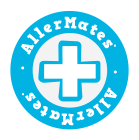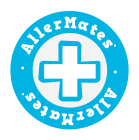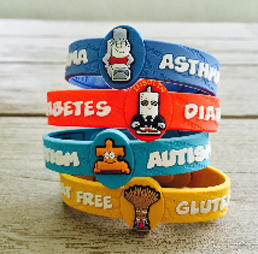
Asthma Inhalers 101: What You Should Know
My son, Ben, not only has severe food allergies, but also deals with asthma (what a fun combo, right?) When Ben was first diagnosed with what I would consider to be mild asthma (in comparison to others), I always wished that someone would hand me a list of pointers that would help me navigate the scary world of children and asthma. Now, after almost a decade of caring for a child with asthma, I thought why not create that for other parents? So here are some helpful pointers that I hope will help you manage asthma in your child especially in regards to their inhalers.
1. Understand the different asthma inhalers
First of all I should start by saying that the medicines contained within an asthma inhaler can not only help manage your child’s asthma but can also help save their life when used properly! There are other medicines used to help treat asthma (like nebulizers and even pills) however asthma inhalers are the most common and effective way to deliver asthma drugs to the lungs. Unfortunately, understanding how and when to use asthma medicines can be confusing for many parents. As a matter of fact according to an article by the Allergy & Asthma Network, a recent survey conducted by the The Journal of Allergy and Clinical Immunology found that nearly half of all 740 parents surveyed in the study did not know the medication class or the frequency of the asthma medication that was to be administered. Without a doubt, I was one of those parents at some point! What helped me tremendously was coming up a simple understanding that there are primarily two different types of asthma inhalers/medicines and without delving into hard-to-remember medical terminology, I found it very useful to simply refer to them as…
A. RESCUE INHALERS – which are meant to do just that – quickly relieve the cough, wheeze, chest tightness and shortness of breath caused by an asthma attack.
B. MAINTENANCE INHALERS – which can be used to help prevent asthma attacks. They do this by reducing the swelling and mucus in the airways hence reducing the chances of having an allergy attack when exposed to triggers. Asthma maintenance meds are also referred to as Control Medications.
It’s important to learn about each inhaler before allowing your child to use them. Talk to your doctor about labeling your asthma inhalers in order to keep track of which one is a RESCUE inhaler and which one is a MAINTENANCE inhaler. I often times use a sharpie or stickers to mark our inhalers with a big “R” or “M”. Our allergist thought I was “brilliant” for doing so. LOL. If anything I marked them because I could not seem to remember which one was which! As a matter of fact, in the early days of caring for Ben’s asthma – I am certain there were times when I gave him the wrong inhaler to use. Nothing brilliant about that! Whatever method you choose to help you navigate the world of inhalers – you don’t want to use a maintenance inhaler for an asthma attack nor a rescue inhaler for daily maintenance.
3. Clean your asthma inhalers.
Metered dose inhalers (MDIs) need to be cleaned! HFA, the chemical that propels the medication forward in these inhalers, is a sticky substance that can build up and clog the inhaler over time. When an inhaler is clogged, it delivers less medication with every puff, so it’s important to keep the pathways clear. To prevent malfunction, remove the metal portion from the mouthpiece and rinse both pieces under warm water. Allow it to dry out completely before reassembling it for use. Our asthma inhaler cases help keep your valuable inhalers clean and accessible.
4. Always keep your inhaler handy.
Asthma in children can be unpredictable. An asthma attack can occur at any time, so it’s incredibly important to keep an inhaler with you at all times. Use one of our asthma inhaler cases to carry your kiddo’s inhaler with you on-the-go. It will help keep the inhaler free from particles. Keep it close by clipping it onto your purse or your kiddo’s backpack or pants using the carabiner hook or velcro loops. Our asthma inhaler cases are available at select on-line stores, AllerMates.com and nationwide in CVS Health stores. As a matter of fact, it was a CVS buyer who suggested that we create a case to hold asthma inhalers for kids, and add it to our growing line of medicine cases!

5. Create an action plan and share it with caregivers and teachers.
Talk to your child’s doctor about creating an Asthma Action Plan. This plan should include information about the medications your child takes to control asthma and what to do in case of an emergency. We designed an AAP with the help of our allergist and I think it’s very easy on the eye and user friendly (the way I like it!). Another one I am fond of is the American Lung Association’s AAP. Make sure to provide a copy of it to your child’s school and schedule an appointment with teachers to go over it one-on-one. Our inhaler cases also come with a folded business card size Asthma Action Plan which fits in the case as well as your wallet.
6. Check your technique.
It never hurts to talk to your child’s doctor about the proper way to use an inhaler. After all, there are a lot of little steps that kids need to remember to do when using an inhaler. For example, MDIs should be shaken before use and sometimes also require spraying a few puffs into the air prior to use as well. Even if your child has been using an inhaler for years, having a doctor look at his or her technique is always helpful!

As always I hope this article is helpful in keeping your kiddos safe! Also please know that the health information contained herein is for educational purposes. For medical advice, diagnoses, and treatment, please consult your physician. Always follow your physician care, medication dosing & carrying instructions.
xo
Iris
Iris  Shamus is a mother to three awesome kids & the founder/CEO of AllerMates. AllerMates was born as a result of her food allergic and asthmatic son, Ben. Iris and/or AllerMates have been featured on Fox News, the Doctors, Veria Living, MSNBC, The Today Show & the Huffington Post with helpful advice on keeping kids safe. Based in New York, Iris & her team ship their products, create informative content & obsess every day about safeguarding kids.
Shamus is a mother to three awesome kids & the founder/CEO of AllerMates. AllerMates was born as a result of her food allergic and asthmatic son, Ben. Iris and/or AllerMates have been featured on Fox News, the Doctors, Veria Living, MSNBC, The Today Show & the Huffington Post with helpful advice on keeping kids safe. Based in New York, Iris & her team ship their products, create informative content & obsess every day about safeguarding kids.
Copyright Awearables, LLC. 2009-2016. All rights reserved. The health information contained herein is for educational purposes.
For medical advice, diagnoses, and treatment, please consult your physician. Always follow your physician care, medication dosing & carrying instructions.






